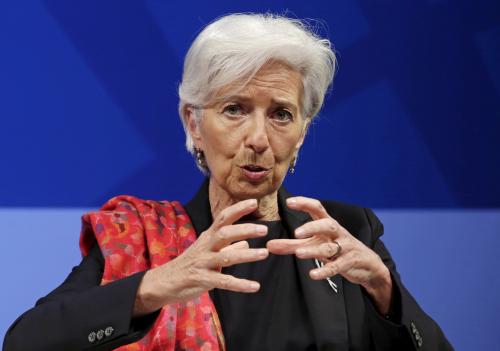Europe’s political uncertainty is getting worse and reasons to worry have multiplied post-Brexit. Spain is heading to new elections, the Greek economy is trapped in an unfortunate no-reforms, no-growth, lack-of-demand equilibrium. Chancellor Merkel is losing ground in Germany and, last but not least, the referendum on constitutional reform in Italy next December may further destabilize the “too big to fail” Italian economy. Dangerous waters are not, of course, restricted to the political arena. Over the past decade, European Union member states have continuously underperformed. This has created chronic problems such as high unemployment and rising inequality. Economic stagnation in turn spurs discontent about Europe among citizens, propelling voters to political extremes, leaving member-state societies hugely divided and polarized.
As a consequence, capital expenditures have slowed over the past several years, as there is no reason to invest in a continent with so much uncertainty. To make matters worse, structural divergences among member states as well as institutional weaknesses have further eroded voters’ belief in the European project.
In a nutshell, the institutional structural weaknesses of Europe in general and the euro area in particular are not limited to the fact that a satisfactory level of supranational coordination of national structural and fiscal policies was not achieved. The pervasive shortcomings are also depriving the common currency area of a market with a level playing field where government interventions are uniform and where bureaucratic and administrative barriers and costs are kept under control.
The structural weakness of Europe relates directly to a failure to handle in a practical way the diversity of institutional maturities and capacities among member states.
The structural weakness of Europe relates directly to a failure to handle in a practical way the diversity of institutional maturities and capacities among member states. The importance of the relationship between institutions and economic performance is well documented, including in research by economists Mancur Olson, Douglas North, and more recently the work of Daron Acemoglu and James Robinson. The literature offers plenty of insight on how national political equilibria are formed by the political system of each country and the national players who benefit from the inherent structural weaknesses that are reinforced due to the national predominance over structural and fiscal policy decisions. Within the EU, these concerns are not only relevant when weaknesses imply a reduced ability of a country to govern itself well as in the case of Greece. The disparities in institutional quality among member states mean policy coordination cannot work beyond a certain point. In turn, this eventually exposes the limits of a structure unable to resolve member-state disputes. Which is how we got into the mess we find ourselves today!
Relating to fiscal policies in particular, it is acknowledged that all monetary unions need a common macroeconomic stabilization function to deal with shocks that cannot be managed at the national level alone. The Five Presidents’ Report sees such a capacity “as the culmination of a process of convergence” and paired to the “further pooling of decision making on national budgets.”
On the one hand, as far as economic policies in particular are concerned, the Five Presidents’ Report, and the proposed system of Competitiveness Authorities, suggest that their capacity could extend beyond tracking wage competitiveness. The proposed structure, given what exists and is proposed, exhausts the capacity of economic policy coordination that, based on the interpretation of the principle of subsidiarity and the principle that national parliaments implement economic policies as enshrined in the Treaty of the European Union, has been the working principle of the EU since its inception.
On the other hand, “convergence in institutions,” especially at the national level and with respect to the institutional and administrative capacity of member states to deliver adherence to the “minimum high-level standards” that are needed to ensure the success of the Single Market, has not been the direct target of determined EU level scrutiny, even though they are referred to in the Five Presidents’ Report. In particular, divergence in the quality of national institutions and the corresponding economic structures that are the focus of the optimum currency area theory were, in particular, missing from this exercise, but are now recognized as a key prerequisite for sustainable income convergence. Finally, it appears reasonable to argue that the transition from policy coordination to common decision making in the economic and fiscal spheres has to be based on an evolution of existing EU law and practices.
It is exactly here, in the context of coordination, that an effective and active fiscal policy has to be addressed additionally. One thing is fiscal discipline and harmonization mentioned above; another is careful, coordinated, fiscal action for increasing, Europe-wide, investment expenditures that is increasing demand and GDP. However, there are those who will argue that in times of fiscal deficits in key countries like France, and sky-high debts in Italy, Greece, Portugal, etc., a coordinated fiscal expansion will risk to worsen fiscal positions in the short-term in particular, not to mention conformity to European treaties and accords. But what if we use the old-fashioned tactic of allowing the European Central Bank to “print and spend” giving the money to Jean-Claude Junker to invest in modern infrastructure both in physical and human capital?
So, instead of exhausting coordination only in enforcing the rules for fiscal discipline among member states, efforts should be concentrated to coordinate cautiously a Europe-wide fiscal expansion, without risking moral hazard or worsening some member states already weak fiscal positions. That will also help monetary policy to become even more effective. Otherwise, the current highly unfortunate political straits we find ourselves in will soon worsen.







Commentary
Why a common fiscal action is the last resort of a stagnating Europe
September 30, 2016